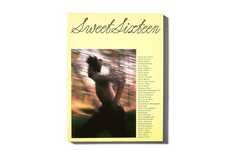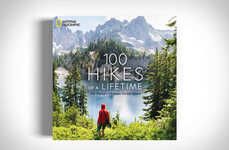Tisah Tucknott — August 19, 2009 — Business
References: facebook & davecullen
Not only is Dave Cullen an acclaimed journalist and author who has contributed to newspapers such as the New York Times, Times of London, Washington Post, and the Guardian, he also served as a Second Lieutenant in the U.S. Army.
His new book and New York Times bestseller, ‘Columbine,’ showcases how Cullen is able to fully embrace one of the biggest tragedies of the 20th century. His work has been recognized by several awards, including the GLAAD Media Award, Society of Professional Journalism awards and the Jovanovich Imaginative Writing Award.
10 Questions with Dave Cullen
1. How did you get involved in writing and what motivates you to continue?
When I was four or five, my older brother and I laid in our bunk beds in the dark at night making up stories. They were sort of ongoing novels or maybe soaps, though we didn’t know those words at the time. We just liked making sh*t up. Interesting stuff, with complex characters and plot lines that kept us captivated. We just knew what we liked. Each night we would add on new scenes, hashing them out together. We would keep the same story going for years.
Looking back, that’s how I got started. It seems to be in my blood.
If I don’t write for a week I start getting restless, then cranky. Two weeks is the breaking point: I’m impossible to live with. So I have to write. I also love it, but I appear to be addicted.
2. How significant are the topics of cool hunting and trend spotting in the world of writing?
They are significant for critics, but anathema to writers. I think trying to follow trends ruins a lot of writers.
3. How do you define a trend?
Something silly people spend way too much of their time chasing. Hahaha.
I think trends are interesting to observe as a curiosity, but dangerous to fixate on when you’re trying to create. I’m a curious guy, so I like watching where things are headed, and I make a lot of use of that in my writing, but only in the material, not the writing itself.
What I mean is, understanding what’s going on in pop culture tells you a lot about what’s going on in the culture and everything I write about has to do with the culture. So it’s really important to my work, but if I try to follow the trends in writing itself: yuck. It just dooms me to copycat-hood.
4. How do you define cool?
[Cool is] something that provokes a sudden, intense and unexpected smile—the kind that goes, ‘ahhhhhhhh’ and the joy lingers. You want to gush about it. You want more of it. You want to savor that feeling and return to it. Anything that does that to you is cool.
5. Do you need a culture of innovation to create something that is cool?
It sure helps. People create cool stuff in all sorts of climates—a great talent can’t be stifled if the artist/inventor/entrepreneur has perseverance. But those two don’t always go together, so a lot of great impulses do get stifled.
Clearly, a positive culture ferments a lot more cool ideas than a withering culture. Innovative cultures seem to be self-replicating: success can inspire success a couple ways. We tend to focus on it inspiring new ideas, which happen, but it also inspires us to fight relentlessly for our projects, because we believe it can happen.
I spent ten years on Columbine, because I was sure, all along that I would find someone to tell my stories—and because along the way, editors were paying for my stories, and publishing them. There were some bleak years when they were not, but I was heartened by the yes’s I’d gotten along the way, and all the other projects that had succeeded.
I hear lots of writers lament that you can’t break into the NY book publishing world, or the NY magazine world—you have to know someone, you have to… they come up with all sorts of imaginary impediments—and I shake my head and keep pitching.
It’s extremely hard to break in, that’s true—just like the vast majority of people [who] get rejected from by the film business, the music business, every business. But look at all the art and all the inventions and small companies that do break through? There are zillions of success stories. Hardly any of those people knew anyone.
We all see that in a culture like 21st century America, it provides the fuel when our personal reserves run out. It also helps a great deal that when you do start to break through to talk to an editor, agent or whatever kind of gatekeeper—even in the early days when the response is a hopeful rejection letter—what comes through in our culture is that these gatekeepers are interested in ushering fresh faces and fresh voices in. They’re eager to do it. That’s what gives them their greatest joy. The reality is that there are very few slots, so they’re saying no to 99.9% of the people contacting them, but their greatest joy comes from finding that exceptional artist and guiding them in. That spirit is out there in our culture, and it’s fostering artists and entrepreneurs every day.
6. What is the best way to create an infectious idea, product or service?
Do what you’re really good at relentlessly. Brainstorm a lot, but not so much it replaces actually doing the work, because good ideas tend to leap out at you while you’re in the midst of it, though more so if you’ve primed the pump with the creative thinking. What I’m saying is, you’re probably not going to get the great idea during the brainstorming session, but you’re going to get it later because of the session. The hunt for the idea works its way into your consciousness and it’s on the lookout while you’re burrowing around in the details doing the work.
7. What is the key to innovation?
Work really hard at your craft. Throw everything you’ve got at it. Listen. That means opening yourself up to criticism—from smart critics—to grow. Experiment a lot, without falling under the spell of experimentation for its own sake, or the delusion that unconventional equal’s innovation. Most experiments fail, so most of your experiments will fail. You’ve got to be honest enough to admit that most of your crap turned out to be crap. Don’t try to pass it off as innovative. Keep the good stuff and keep moving.
For me, it took about 40 years of doing it, but I did most of my growing in the last 15. It wasn’t until went to the Middle East for two years to save a bunch of money, quit my job and plunge into it full-time that I really developed. Going back to school made all the difference. Developing a peer group did, too. That’s sort of a lifelong school—good, smart, criticism and advice—at my fingertips when I need it.
I don’t think you can get really great at anything part-time, or doing it all on your own. Surrendering to the idea that millions of people have also attempted writing in their lifetimes, and they’ve made most of the same mistakes and I could learn from them made a huge difference.
Confidence was also crucial to me. Writers talk about finding their voice as the first huge hurdle, and that’s pretty much dead-on, except that it’s less a matter of finding it than trusting it. It’s there, but most of us don’t really believe its good enough. (The same voice I use to blab away on the phone, people are going to pay me to use that on paper? Readers are going to spend hours at a time listening to me? It’s hard to believe.) Most of the over-writing and cheesy writing and banal writing comes from not trusting that voice, and trying to write or just not getting the riff of it at all.
Just this week, I was toying with diving back into an old topic, and looked at a story I wrote seven years ago. There were lots of good things in there, but the lack of confidence was appalling. I jumped around way too quickly, because I didn’t trust myself. I tried to hard. It was sad. But it was also refreshing to see how far I’ve come. I know how to do that better now. I’ve grown a lot, and I trust myself.
A lot of it comes down to writing, writing, writing, constantly, but you also need to know when to let it go. The best approach for me is usually struggle with it for awhile, let go of it, let it percolate down there in the unconscious part of my brain, wherever that is, and come back when it’s ready. It’s usually ready for a new round in a day or two, but sometimes just an hour or two, and sometimes weeks or months.
I really have no idea how that works or why, exactly, but I have learned the hard way, over and over, that my unconscious mind is a million times better than the conscious part at sorting it all out. Long walks turn out to be great for me, and bike rides. I always have paper with me, because I’ll be walking along, twenty minutes in, and the stuff is suddenly just there, ready to spill out all over the page.
8. What are the most important trends you see in the writing industry?
Writing good stories, that would be the biggie. I have a feeling trend-hunters are going to hate that answer, but that’s exactly why we have so much crap: people chasing short-term trends and trying to recreate the last gem.
They forget the big picture. The most important trend in writing has been around [for] at least 3,000 years since Homer, and those [were] really great stories. Good characters, good plot, good themes, interesting motivations, vivid depictions… all that stuff.
Writing gets better and better as we explore more, understand better, and keep digging away at both timeless and timely ideas. Feeling what’s going on in your time, with your generation—or the one before or after—helps. Tunneling way beneath the surface to figure that out, and spinning good stories that shed light, that’s what it’s always about.
I know a lot of writers who follow the latest writing closely, and always want to know who is hot. Blech. You’re never going to get hot yourself that way. That’s a good approach if you’re an editor or an agent, but not a writer. At least that’s my take on it. I keep gobbling up great writing, but disregard what’s hot or where it’s headed. That’s just noise. People get turned on by great stuff. Do it great and maybe you’ll create a trend? Or maybe you won’t, who cares? You’ll have created something great.
9. Professionally, what do you want to be doing or studying in 10 years?
Writing books, mostly, with lots of time off for magazine pieces. Or whatever the future version of magazine writing is. I hope to do several 4,000 to 5,000-word reported pieces every year or two to keep me out in the field, trying out new ideas, learning things, meeting people, and inspiring new books.
10. What are your most important hobbies?
Dancing, films, traveling, music, reading, and making jokes with my friends. Are those hobbies? I’ve always found the word [hobby] like something from another language that makes no sense to me. For what it’s worth, I have never thought of anything I do as a hobby, but I think that’s what you mean. Oh, and I like to garden. That probably qualifies.
His new book and New York Times bestseller, ‘Columbine,’ showcases how Cullen is able to fully embrace one of the biggest tragedies of the 20th century. His work has been recognized by several awards, including the GLAAD Media Award, Society of Professional Journalism awards and the Jovanovich Imaginative Writing Award.
10 Questions with Dave Cullen
1. How did you get involved in writing and what motivates you to continue?
When I was four or five, my older brother and I laid in our bunk beds in the dark at night making up stories. They were sort of ongoing novels or maybe soaps, though we didn’t know those words at the time. We just liked making sh*t up. Interesting stuff, with complex characters and plot lines that kept us captivated. We just knew what we liked. Each night we would add on new scenes, hashing them out together. We would keep the same story going for years.
Looking back, that’s how I got started. It seems to be in my blood.
If I don’t write for a week I start getting restless, then cranky. Two weeks is the breaking point: I’m impossible to live with. So I have to write. I also love it, but I appear to be addicted.
2. How significant are the topics of cool hunting and trend spotting in the world of writing?
They are significant for critics, but anathema to writers. I think trying to follow trends ruins a lot of writers.
3. How do you define a trend?
Something silly people spend way too much of their time chasing. Hahaha.
I think trends are interesting to observe as a curiosity, but dangerous to fixate on when you’re trying to create. I’m a curious guy, so I like watching where things are headed, and I make a lot of use of that in my writing, but only in the material, not the writing itself.
What I mean is, understanding what’s going on in pop culture tells you a lot about what’s going on in the culture and everything I write about has to do with the culture. So it’s really important to my work, but if I try to follow the trends in writing itself: yuck. It just dooms me to copycat-hood.
4. How do you define cool?
[Cool is] something that provokes a sudden, intense and unexpected smile—the kind that goes, ‘ahhhhhhhh’ and the joy lingers. You want to gush about it. You want more of it. You want to savor that feeling and return to it. Anything that does that to you is cool.
5. Do you need a culture of innovation to create something that is cool?
It sure helps. People create cool stuff in all sorts of climates—a great talent can’t be stifled if the artist/inventor/entrepreneur has perseverance. But those two don’t always go together, so a lot of great impulses do get stifled.
Clearly, a positive culture ferments a lot more cool ideas than a withering culture. Innovative cultures seem to be self-replicating: success can inspire success a couple ways. We tend to focus on it inspiring new ideas, which happen, but it also inspires us to fight relentlessly for our projects, because we believe it can happen.
I spent ten years on Columbine, because I was sure, all along that I would find someone to tell my stories—and because along the way, editors were paying for my stories, and publishing them. There were some bleak years when they were not, but I was heartened by the yes’s I’d gotten along the way, and all the other projects that had succeeded.
I hear lots of writers lament that you can’t break into the NY book publishing world, or the NY magazine world—you have to know someone, you have to… they come up with all sorts of imaginary impediments—and I shake my head and keep pitching.
It’s extremely hard to break in, that’s true—just like the vast majority of people [who] get rejected from by the film business, the music business, every business. But look at all the art and all the inventions and small companies that do break through? There are zillions of success stories. Hardly any of those people knew anyone.
We all see that in a culture like 21st century America, it provides the fuel when our personal reserves run out. It also helps a great deal that when you do start to break through to talk to an editor, agent or whatever kind of gatekeeper—even in the early days when the response is a hopeful rejection letter—what comes through in our culture is that these gatekeepers are interested in ushering fresh faces and fresh voices in. They’re eager to do it. That’s what gives them their greatest joy. The reality is that there are very few slots, so they’re saying no to 99.9% of the people contacting them, but their greatest joy comes from finding that exceptional artist and guiding them in. That spirit is out there in our culture, and it’s fostering artists and entrepreneurs every day.
6. What is the best way to create an infectious idea, product or service?
Do what you’re really good at relentlessly. Brainstorm a lot, but not so much it replaces actually doing the work, because good ideas tend to leap out at you while you’re in the midst of it, though more so if you’ve primed the pump with the creative thinking. What I’m saying is, you’re probably not going to get the great idea during the brainstorming session, but you’re going to get it later because of the session. The hunt for the idea works its way into your consciousness and it’s on the lookout while you’re burrowing around in the details doing the work.
7. What is the key to innovation?
Work really hard at your craft. Throw everything you’ve got at it. Listen. That means opening yourself up to criticism—from smart critics—to grow. Experiment a lot, without falling under the spell of experimentation for its own sake, or the delusion that unconventional equal’s innovation. Most experiments fail, so most of your experiments will fail. You’ve got to be honest enough to admit that most of your crap turned out to be crap. Don’t try to pass it off as innovative. Keep the good stuff and keep moving.
For me, it took about 40 years of doing it, but I did most of my growing in the last 15. It wasn’t until went to the Middle East for two years to save a bunch of money, quit my job and plunge into it full-time that I really developed. Going back to school made all the difference. Developing a peer group did, too. That’s sort of a lifelong school—good, smart, criticism and advice—at my fingertips when I need it.
I don’t think you can get really great at anything part-time, or doing it all on your own. Surrendering to the idea that millions of people have also attempted writing in their lifetimes, and they’ve made most of the same mistakes and I could learn from them made a huge difference.
Confidence was also crucial to me. Writers talk about finding their voice as the first huge hurdle, and that’s pretty much dead-on, except that it’s less a matter of finding it than trusting it. It’s there, but most of us don’t really believe its good enough. (The same voice I use to blab away on the phone, people are going to pay me to use that on paper? Readers are going to spend hours at a time listening to me? It’s hard to believe.) Most of the over-writing and cheesy writing and banal writing comes from not trusting that voice, and trying to write or just not getting the riff of it at all.
Just this week, I was toying with diving back into an old topic, and looked at a story I wrote seven years ago. There were lots of good things in there, but the lack of confidence was appalling. I jumped around way too quickly, because I didn’t trust myself. I tried to hard. It was sad. But it was also refreshing to see how far I’ve come. I know how to do that better now. I’ve grown a lot, and I trust myself.
A lot of it comes down to writing, writing, writing, constantly, but you also need to know when to let it go. The best approach for me is usually struggle with it for awhile, let go of it, let it percolate down there in the unconscious part of my brain, wherever that is, and come back when it’s ready. It’s usually ready for a new round in a day or two, but sometimes just an hour or two, and sometimes weeks or months.
I really have no idea how that works or why, exactly, but I have learned the hard way, over and over, that my unconscious mind is a million times better than the conscious part at sorting it all out. Long walks turn out to be great for me, and bike rides. I always have paper with me, because I’ll be walking along, twenty minutes in, and the stuff is suddenly just there, ready to spill out all over the page.
8. What are the most important trends you see in the writing industry?
Writing good stories, that would be the biggie. I have a feeling trend-hunters are going to hate that answer, but that’s exactly why we have so much crap: people chasing short-term trends and trying to recreate the last gem.
They forget the big picture. The most important trend in writing has been around [for] at least 3,000 years since Homer, and those [were] really great stories. Good characters, good plot, good themes, interesting motivations, vivid depictions… all that stuff.
Writing gets better and better as we explore more, understand better, and keep digging away at both timeless and timely ideas. Feeling what’s going on in your time, with your generation—or the one before or after—helps. Tunneling way beneath the surface to figure that out, and spinning good stories that shed light, that’s what it’s always about.
I know a lot of writers who follow the latest writing closely, and always want to know who is hot. Blech. You’re never going to get hot yourself that way. That’s a good approach if you’re an editor or an agent, but not a writer. At least that’s my take on it. I keep gobbling up great writing, but disregard what’s hot or where it’s headed. That’s just noise. People get turned on by great stuff. Do it great and maybe you’ll create a trend? Or maybe you won’t, who cares? You’ll have created something great.
9. Professionally, what do you want to be doing or studying in 10 years?
Writing books, mostly, with lots of time off for magazine pieces. Or whatever the future version of magazine writing is. I hope to do several 4,000 to 5,000-word reported pieces every year or two to keep me out in the field, trying out new ideas, learning things, meeting people, and inspiring new books.
10. What are your most important hobbies?
Dancing, films, traveling, music, reading, and making jokes with my friends. Are those hobbies? I’ve always found the word [hobby] like something from another language that makes no sense to me. For what it’s worth, I have never thought of anything I do as a hobby, but I think that’s what you mean. Oh, and I like to garden. That probably qualifies.
Trend Themes
1. Storytelling - The trend of writing good stories with good characters, plot, and themes are the most important trend in writing industry.
2. Cultural Analysis - Understanding what's happening in the pop culture provides insight in society, which leads to better storytelling.
3. Resilience - Creating an innovative product or service requires perseverance, confidence, experimentation, and the acceptance of failure.
Industry Implications
1. Publishing - The publishing industry must recognize good storytelling as the most important trend in writing and provide opportunities for emerging writers.
2. Media - Media companies can leverage cultural knowledge and analysis for better content creation, making their stories more relevant and impactful.
3. Entrepreneurship - Entrepreneurs must show resilience and accept failure as a normal part of the process, while constantly experimenting and improving their innovative products or services.
1.9
Score
Popularity
Activity
Freshness






















